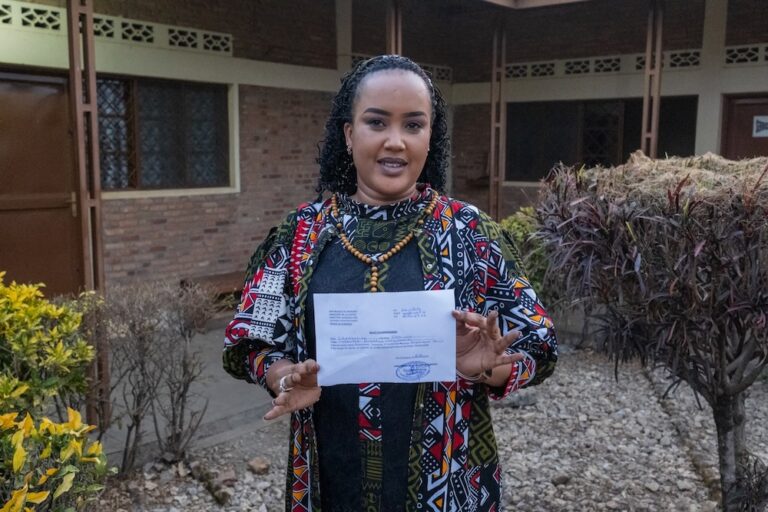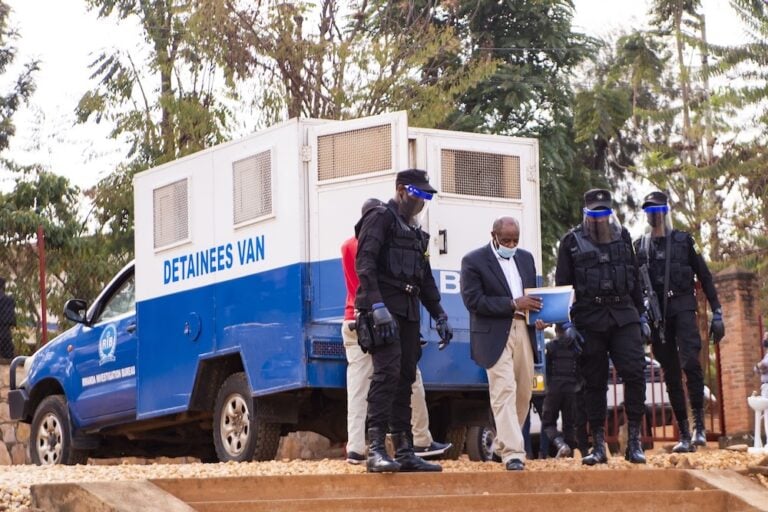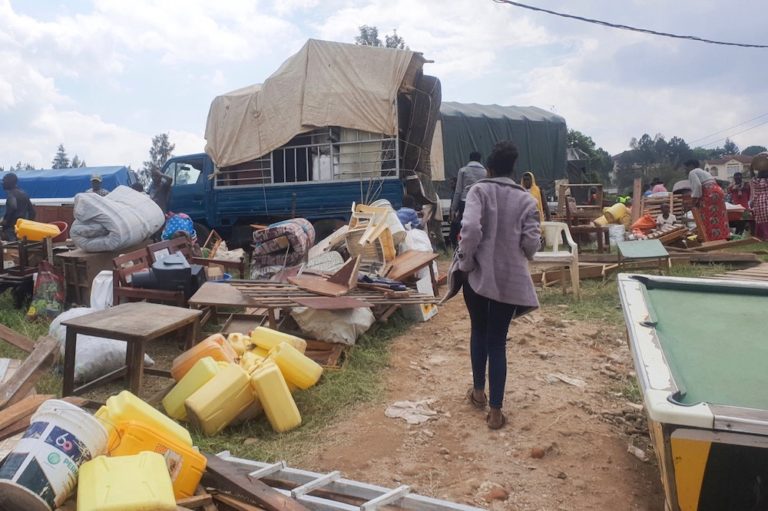(RSF/IFEX) – Reporters Without Borders has urged Abdou Diouf, Secretary General of the International Organisation of La Francophonie (OIF), to intervene with President Paul Kagame on behalf of three wrongly imprisoned journalists, when he makes an official visit to Rwanda on 21 February 2006. The journalists are Jean-Léonard Rugambage, Tatiana Mukakibibi and Dominique Makeli. “Not […]
(RSF/IFEX) – Reporters Without Borders has urged Abdou Diouf, Secretary General of the International Organisation of La Francophonie (OIF), to intervene with President Paul Kagame on behalf of three wrongly imprisoned journalists, when he makes an official visit to Rwanda on 21 February 2006. The journalists are Jean-Léonard Rugambage, Tatiana Mukakibibi and Dominique Makeli.
“Not one of them has had the right to a trial and the charges brought against them are vague and changing”, said the organisation in its letter to Abdou Diouf, which also details the most common forms of press freedom violations in Rwanda.
These were “seizures of the few publications that still dare to be critical, public threats and physical intimidation against journalists who displease.”
Recalling the terms of the Bamako Declaration, under which “democracy and the French-speaking community are inextricably linked”, the organisation urged the OIF secretary general to “intercede on their behalf with the Rwandan government. “Their rights as citizens and the freedom of journalists have been trampled. It is vital to put an end to this outrage, perpetuated with complete impunity at the heart of the French-speaking world,” said RSF.
Jean-Léonard Rugambage, journalist for the independent bi-monthly “Umuco”, was sentenced on 23 November 2005 to one year in prison for “contempt of court” after he contested the impartiality of the president of the people’s court, the “gacaca” which was to try him. His trial for his alleged involvement in a murder during the 1994 genocide was adjourned until the following year, by which time the journalist will have served that sentence. Rugambage was arrested on 7 September, 10 days after the publication of an edition of “Umuco” in which he exposed corruption of some gacaca judges in Ruyumba district and the use of the people’s courts to settle personal scores. The journalist appeared in court for the first time on 5 October, in the presence of a Reporters Without Borders’ representative, before the Ruyumba gacaca, presided over by Théophile Kalisa, at which witnesses made a variety of accusations against him, from distributing weapons to forging passports. One witness accused him of raiding a bank after killing the manager, during the genocide. The victim’s father had nevertheless said he had never seen the journalist. At the 23 November hearing, Rugambage was accompanied by two co-defendants who confessed to the murder of the bank manager. According to him, the victim, a Hutu, was murdered for criminal reasons and not as part of the genocide. Moreover, in 1996, the journalist was tried and acquitted by the ordinary courts on the same charge. He says that the judge, Théophile Kalisa, was among his accusers at this stage.
Tatiana Mukakibibi was a presenter and programme producer on Radio Rwanda. She and her colleagues fled in July 1994 to the Democratic Republic of Congo (DRC). She returned to Rwanda on 10 August, to Kapgayi, near Gitarama, where she worked with a priest, André Sibomana (former editor of “Kinyamateka” and winner of the 1994 Reporters Without Borders – Fondation de France press freedom award, who died in March 1998). In July 1995, she was arrested and held for several days. For fear of reprisals she then fled to Uganda. She returned to Rwanda on 30 September 1996 and two days later police came to arrest her at her home in Ntenyo, Gitarama. Mukakibibi was immediately taken to a communal cell and detained in very harsh conditions. The day after her arrest, a police inspector asked her to state that she had left for Uganda under the protection of the priest, Sibomana. She was told she would be free to leave if she confessed. She refused and five days later was accused of having distributed weapons and having killed Eugène Bwanamudogo, a Tutsi who produced radio programmes for the ministry of agriculture. During the summer of 2001, the deputy prosecutor for Gitarama confirmed the charges. According to Mukakibibi, her imprisonment was the result of being framed by people in her village because André Sibomana sent reports to international organisations exposing abuses committed by Tutsis in reprisal for the April 1994 genocide. Some of the people named in these reports apparently tried to use her to get André Sibomana arrested.
Dominique Makeli, journalist for Radio Rwanda, has been held at Kigali central prison (PCK) since 18 September 1994. He fled in the first days of the genocide to Kibuye, western Rwanda, where one of his sons had been killed one month earlier by extremist Hutu militiamen. On his return to Kigali on 18 September, he was arrested at his home by an agent from military intelligence (DMI). In October 2001, the state prosecutor, Sylvaire Gatambiye, told Reporters Without Borders that Makeli was accused of “incitement to genocide in his reporting.” In May 1994, he covered an appearance of the Virgin in Kibeho, west of Butare, and reported a statement she was believed to have made as, “the parent is in heaven”. The prosecutor explained, that in the context of the time, that meant, “President Habyarimana is in heaven” and people interpreted the message as God’s support for the former president and, by extension, the policy of massacre of the Tutsis.


